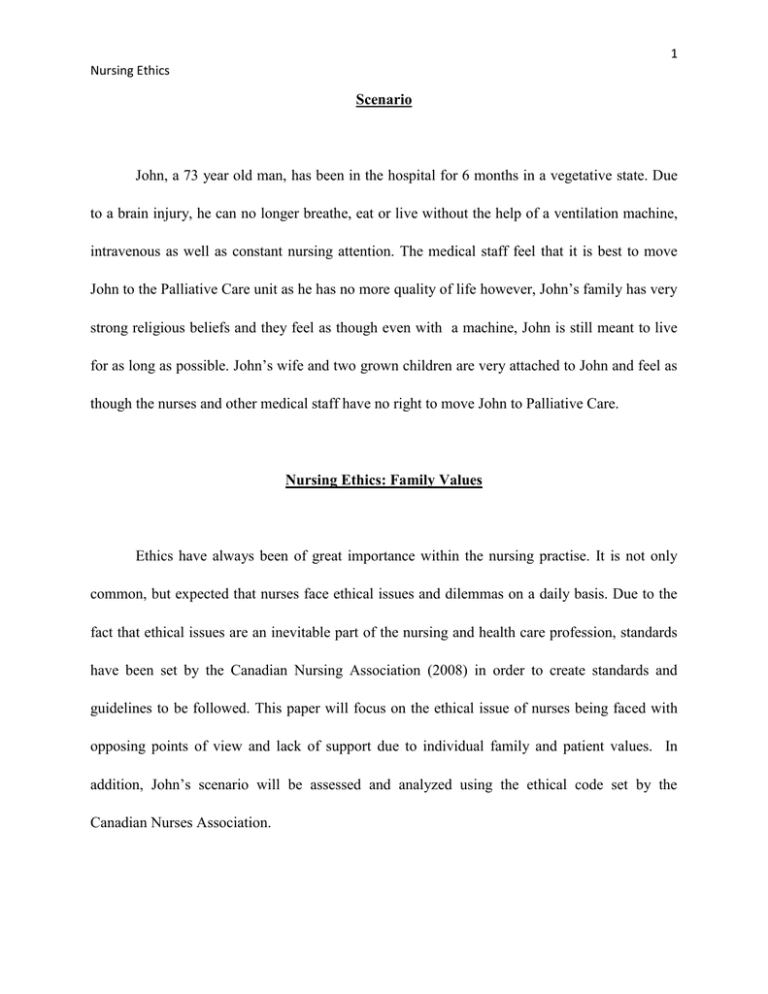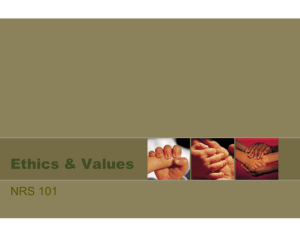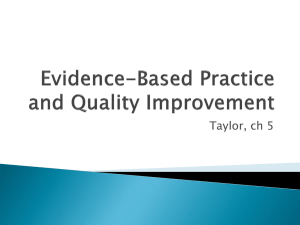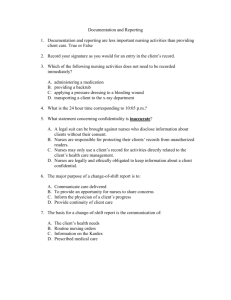
1
Nursing Ethics
Scenario
John, a 73 year old man, has been in the hospital for 6 months in a vegetative state. Due
to a brain injury, he can no longer breathe, eat or live without the help of a ventilation machine,
intravenous as well as constant nursing attention. The medical staff feel that it is best to move
John to the Palliative Care unit as he has no more quality of life however, John’s family has very
strong religious beliefs and they feel as though even with a machine, John is still meant to live
for as long as possible. John’s wife and two grown children are very attached to John and feel as
though the nurses and other medical staff have no right to move John to Palliative Care.
Nursing Ethics: Family Values
Ethics have always been of great importance within the nursing practise. It is not only
common, but expected that nurses face ethical issues and dilemmas on a daily basis. Due to the
fact that ethical issues are an inevitable part of the nursing and health care profession, standards
have been set by the Canadian Nursing Association (2008) in order to create standards and
guidelines to be followed. This paper will focus on the ethical issue of nurses being faced with
opposing points of view and lack of support due to individual family and patient values. In
addition, John’s scenario will be assessed and analyzed using the ethical code set by the
Canadian Nurses Association.
2
Nursing Ethics
It is apparent that every patient and their family possess a set of values based on personal
opinions, beliefs and religious affiliations. With this in mind, it is expected that nurses are
constantly questioned, interrogated and fought against. According to the code of ethics presented
by the Canadian Nurses Association (2008), nurses must uphold both legal and ethical
requirements when dealing with patients. The code entails detailed nursing values and
responsibilities. These responsibilities include: providing safe, compassionate, competent and
ethical care, promoting health and well-being, promoting and respecting informed decisionmaking, preserving dignity, maintaining privacy and confidentiality, promoting justice and
finally, being accountable. The ethical principles are extremely important particularly because
nursing is a self-regulated profession. Nurses and other health care professionals are more than
just health care providers and caregivers. It is their responsibility to act as decision-makers and
build close relationships with families. Because these circumstances are most times out of the
control of the health care provider, the ethical code is necessary to assist in understanding social
justice and core ethical responsibilities.
In reference to the scenario illustrated at the beginning, the nursing profession is
significantly interconnected with families. It is unfortunate however, when families do not
understand or agree with that of the nursing professionals due to values and personal beliefs. In
chapter three of Interpersonal Relationships: Professional Communication Skills for Nurses,
Bogg’s (2011) describes personal and professional value systems pertaining to the context of
barriers when thinking critically and reasoning ethically. It is explained that personal value
systems are shaped from childhood though family and religious beliefs as well as life
3
Nursing Ethics
experiences. In addition to personal value systems as well as professional value systems play a
large part in the decisions nurses make. Within John’s situation, it is clear that his family is
neglecting to see the nurses’ reasoning and is viewing the situation from their religious
perspective only. It is noted that medical staff are truly looking as what is best for the patient.
John is the priority in this situation and the nurses are simply suggesting what is best for him. At
the same time however, nurses must obide by professional standards and act in a respectful way
which demonstrates to patients that they care and understand their perspectives. Pauly et al
(2009) discuss how moral situations are a cause of great distress on patients, families and nurses.
This moral distress is a cause for promoting the ethical guidelines set by the Canadian Nursing
Association. Having these guidelines assists in the removal of moral distress as they convey
specific strategies and procedures that nurses should use.
According to the Canadian Nurses Association (2008) nursing values under the category
of “Promoting and respecting informed decision-making” state that “Nurses recognize, respect
and promote a person’s right to be informed and make decisions. Nurses uphold principles of
justice by safeguarding human rights, equity and fairness and by promoting the public good”
(p.11). By recognizing these principles, nurses are in fact promoting an unbiased approach
toward ethical dilemmas and are abiding by standards of fairness and human rights. In John’s
situation, it is vital for nurses to respect the wishes of the family and demonstrate support even if
they themselves disagree. The main goal is to ensure the patient’s best interests and it is the
nurses’ responsibility to find a way to do that in the most respectful manner.
Due to situations such as the one outlined in this paper, the three ethical principles that
are most commonly appealed to in bioethics are respect for persons, beneficence and justice.
4
Nursing Ethics
According to Oberle and Bouchal (2009). Respect for persons relates to the rights of the patient
particularly pertaining to consensus of treatment. This principle ties into having respect for John
and his family’s opinions. Beneficence promotes the well-being of the patient and instills the
notion to “do good”. This is a term that is often associated with ethics because it is prominently
subjective to each individual and their family. Justice refers to fair treatment of nurses and other
healthcare workers. This principle advocated for nursing professionals and instills equity toward
their performance. In addition social justice lends itself to promote for family and patient values.
It is evident that the risks and benefits of moving John to the palliative care unit differ
greatly in accordance to the family and the healthcare team. From a medical perspective, it is
apparent that the patient is not going to benefit from being resuscitated as he has no more quality
of life and needs to move to the palliative care unit. This can be truly considered for “the good”
of the patient as the healthcare professionals have the patient’s best interest which ultimately
supports the principle of beneficence. From the family’s perspective, it is evident that religious
values are paving the way for what they feel is for “the good” of the patient. Both perspectives
conflict with one another as beneficence, in this circumstance, holds different meaning for the
different viewpoints involved.
The International Council of Nurses (2012) makes note of the importance of nurses
partaking in the responsibility of demonstrating supportive action in order to meet the health and
social needs of the public. In addition, the nurse is responsible for advocating equity and social
justice in resource allocation, access to health care and other social and economic services.
Nurses are also expected to demonstrate professional values including respectfulness,
responsiveness, compassion, trustworthiness and integrity. John’s situation brings forth a
5
Nursing Ethics
difficult ethical dilemma because it is hard for the nurses to act on their professional values when
they are looking at what’s best for the patient.
Seeing as how the discrepancy between the family and the healthcare professional is a
serious matter, it would be in the best interest of the health care team to place a larger emphasis
on finding a consensus between their medical advice and the family’s belief system. The severity
of John’s situation and the reasoning behind why it was so important for him to no longer use
machines and be moved to palliative care should be explained to the family in a very serious
manner. It is the nurses role to inform the family of the medical reasoning behind the decision
and make it clear that John is not able to sustain a quality life anymore. Using the ethical
principles outlined by the Canadian Nurses Association, it is the nurses’ responsibility to use
informed decision-making practices that ultimately end up promoting the patient and his best
interest
This paper has examined John’s situation as it relates to a serious nursing ethical
dilemma. Using the ethical code set by the Canadian Nurses Association, it was illustrated that
nurses are required to respect patient needs but at the same time, promote the best medical
practices and strategies for the patient. It is evident that John is caught between a family who
loves him and has strict religious beliefs and a team of nurses and medical staff who are looking
out for his best interest. It is ultimately up to the healthcare professionals to take control and
ensure the family that the extreme measures taken are for John’s best interest as he no longer has
quality of life.
6
Nursing Ethics
Appendix
Part I: Nursing Values and Ethical Responsibilities
The first part of the code, “Nursing Values and Ethical Responsibilities,” describes the core
responsibilities central to ethical nursing practice. These ethical responsibilities are articulated
through seven primary values and accompanying responsibility statements, which are grounded in
nurses’ professional relationships with individuals, families, groups, populations and communities as
well as with students, colleagues and other health-care professionals.
Primary Nursing Values
1. Providing safe, compassionate, competent and ethical care
Nurses provide safe, compassionate, competent and ethical care.
2. Promoting health and well-being
Nurses work with people to enable them to attain their highest possible level of health and wellbeing.
3. Promoting and respecting informed decision-making
Nurses recognize, respect and promote a person’s right to be informed and make decisions.
4. Preserving dignity
Nurses recognize and respect the intrinsic worth of each person.
5. Maintaining privacy and confidentiality
Nurses recognize the importance of privacy and confidentiality and safeguard personal, family and
community information obtained in the context of a professional relationship.
6. Promoting justice
Nurses uphold principles of justice by safeguarding human rights, equity and fairness and by
promoting the public good.
7. Being accountable
Nurses are accountable for their actions and answerable for their practice.
Nurses in all domains of practice bear the ethical responsibilities identified under each of the seven
primary nursing values. These ethical responsibility statements, which appear in the full text of the
code, are intended to help nurses apply the code.
7
Nursing Ethics
Part II: Ethical Endeavours
There are broad aspects of social justice that are associated with health and well-being and that
ethical nursing practice addresses. These aspects relate to the need for change in systems and
societal structures in order to create greater equity for all. Part II of the code contains thirteen
statements entitled “ethical endeavours,” which are intended to guide nurses in their practice.
Nurses should endeavour as much as possible, individually and collectively, to advocate for and
work toward eliminating social inequities through the ethical endeavours. These endeavours address
issues related to access, change, choice, equality and rights.
References:
Arnold, C.E. & Boggs, U.K. (2011). Interpersonal relationships: Professional communication
skills for nurses (6th ed). United States: Elsevier Saunders.
Canadian Nurses Association . (2008). Nursing Ethics. Retrieved from http://www.cnaaiic.ca/cna/documents/pdf/publications/Code_of_Ethics_2008_e.pdf
International Council of Nurses. (2012). Code of Ethics for Nurses. Retrieved from
http://www.icn.ch/about-icn/code-of-ethics-for-nurses.
Oberle, K & Bouchal, S.R. (2009). Ethics in Canadian Nursing Practice. Toronto, ON: Pearson
Prentice Hall.
Pauly, B., Varcoe, C., Storch, J., & Newton, L. (2009). Registered nurses’ perceptions of moral
distress and ethical climate. Nursing Ethics, 16(5), 561-573.






